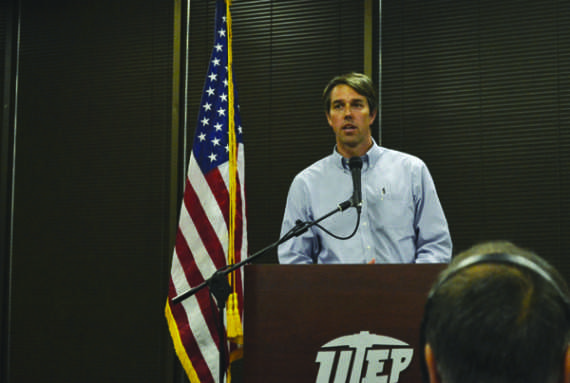UTEP hosted a symposium on Monday where a group of panelists spoke about the drug war and its effects on journalists and the public.
The drug war and violence involving the cartels began in 2006, peaking in 2010 after 10,500 people were killed, earning Ciudad Juárez, Mexico the title of murder capital city in the world. Since 2011, however, the number of deaths has declined.
Anabel Hernandez, Mexico’s leading investigative journalist, began studying the cartels in 2005 after witnessing a group of children working with and selling marijuana.
“I never saw the government interfere with this,” Hernandez said.
Hernandez began working closely with these issues, eventually reporting on the drug war and exposing the corruption with Mexico’s government, particularly in the case of Joaquín (El Chapo) Guzmán.
As Hernandez began reporting on this topic, criminal documents and reports were leaked, furthering Hernandez’s knowledge about the corruption in Mexico.
“Guzmán exists because the government wants him to exist. No one wants to put him in jail because he makes the too much money for the drug world, but there are others—mayors, congressmen, politicians, nice people. We know Guzmán, but we don’t know the other names,” Hernandez said.
Hernandez believes that Guzmán is the most wanted drug lord because of the protection he receives from the Mexican government and the money he possesses to bribe others.
“The war between the cartels started with Vicente Fox by using the power of the state against others,” Hernandez said. “The corruption is everywhere.”
Gilberto Gonzalez, executive director of the Texas Narcotics Officers Association and ex DEA-agent, argued that the drug war does not have to follow the route it has taken.
“Money laundering is the most effective way to beat the cartels—take their money and it hurts them,” Gonzalez said.
Rep. Beto O’Rourke, D-Texas, began his involvement with the drug war in 2009 after seeing the increasing amounts of violence in Cd. Juárez.
“In 2009 with the city council we invented a community based resolution on the drug violence in Juárez to say that we have a thoughtful, honest discussion on the continuation of the war on drugs and whether we should be fighting for them,” O’Rourke said.
After opening this discussion to the public for voting, it passed unanimously.
“We’ve been at this for at least 40 years and we really want to try reduce access to the most vulnerable in our communities—children and addicts—to these potent substances,” O’Rourke said.
However, Dr. Howard Campbell, professor of anthropology and sociology, believes that the use and production of drugs can never really be stopped.
O’Rourke argued against this statement by saying that drug lords continue profiting from selling drugs, more children are exposed to them because of the availability and prison populations have increased.
“We spent $1 trillion of our hard-earned taxpayer money to prosecute this war,” O’Rourke said. “Our neighboring city should be our closest ally but we have pushed this war onto them.”
O’Rourke said with the original goals of the city council, the war on drugs has failed and with no clear resolution for the drug war, the drug policy needs to be revisited.
Lorain Watters may be reached at [email protected].











